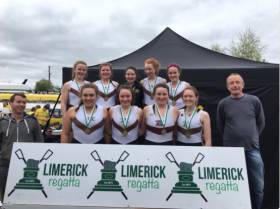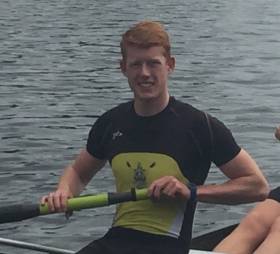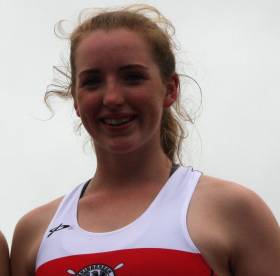Displaying items by tag: Daire Lynch
Ireland Double Wins B Final at European Championships
On a day of promise for Ireland in A Finals of the European Rowing Championships, Ireland’s Philip Doyle and Ronan Byrne finished their campaign with a fine win in the B final of the double sculls.
Italy set the early pace in Varese, with Ireland and Germany closely tracking them through the middle and later stages. Doyle and Byrne produced a good sprint finish to win. This places them seventh overall.
The C Final was won by Norway’s Kris Brun and Are Strandli. The lightweight crew, which finished third at Rio 2016, campaigned in the open weight class at this event.
Daire Lynch finished his campaign in the single sculls quite well. He took a close-up second in the C Final behind impressive Russian sculler Nikolay Pimenov, who led down the course from the start. Lynch, who pushed hard at the end, places 14th overall at the Championships in a very tough event.
European Rowing Championships, Varese, Italy, Day Three (Irish interest)
Men
Double Sculls – B Final (Places 7 to 12): 1 Ireland (R Byrne, P Doyle) 6:21.47, 2 Italy 6:22.52, 3 Germany 6:23.29.
Single Sculls – C Final (Places 13 to 18): 1 Russia 7:08.08, 2 Ireland (D Lynch) 7:09.01.
Cork Boat Club and Clonmel's Lynch Excel at Limerick
#Rowing: Cork Boat Club had a good day at Limerick Regatta at O’Brien’s Bridge today. They won the the men’s intermediate eight and senior pair and the women’s junior 18 eight. UCD won the women’s novice eight and Daire Lynch of Clonmel, who won the single sculls time trial in a very fast time (five minutes and nine seconds), went on to take the senior and intermediate singles titles.
Limerick Regatta, O’Brien’s Bridge (Selected Results)
Men
Eight – Intermediate: Cork. Club: Neptune. Jun 18: Neptune. Masters – Final One (b-c): St Michael’s A. Final Two (d-e): Athlone. Jun 16: Col Iognaid.
Four – Sen: St Michael’s. Inter, coxed: Cork. Jun 18A, coxed: St Michael’s.
Pair – Senior: Cork. Jun 18: Clonmel.
Sculling
Quad – Sen: Carlow. Nov, coxed: UCC. Jun 18A: Carlow. Jun 16, coxed: CRCC.
Double – Inter: Castleconnell B.
Single – Senior: Clonmel (D Lynch). Inter: Clonmel (D Lynch). Jun 18A: Clonmel (A Butler). Jun 16: Castleconnell (R O’Neill). Masters – Final One: Lady Elizabeth (B Smyth). Final Two: Cork (B Crean). Final Three: Galway (A McCallion).
Women
Eight – Nov: UCD. Jun 18: Cork. Jun 16: St Michael’s.
Four – Sen: Shannon. Inter, coxed: Shannon. Jun 18: Col Iognaid.
Pair – Sen: Fermoy. Jun 18: Fermoy.
Sculling
Quadruple Novice, coxed: Cappoquin. Jun 18: Cork. Jun 16, coxed: Killorglin. Masters, coxed: Univ of Limerick
Double – Inter: Carlow.
Single – Inter: Garda (B Larsen). Jun 18A: Carlow (C Nolan). Jun 16: Cork (C O’Sullivan). Masters: Offaly (C Nolan).
Fine Finish By Ireland Double at World Rowing Championships
#Rowing: Ireland's junior men's double finished the World Rowing Regatta by taking a very encouraging second place in the B Final. The ambitious duo of Ronan Byrne and Daire Lynch fought it out with the Netherlands for third in the middle stages as South Africa and Canada disputed the lead. But Ireland put in an excellent second half in the strong tailwind conditions. They passed the Netherlands and then Canada and were just 1.33 seconds behind South Africa on the line. Byrne and Lynch place eighth in the world.
World Rowing Championships, Rotterdam (Irish interest; Selected Results)
Men
Junior Double Sculls - B Final (Places 7 to 12): 1 South Africa 6:32.29, 2 Ireland (R Byrne, D Lynch) 6:33.72.
Women
Junior Double Sculls - B Final (Places 7 to 12): 1 Spain 7:13.72; 6 Ireland (A Casey, E Hegarty) 7:22.68.
Good Start by Ireland Junior Double at World Rowing Championships
#Rowing: The Ireland junior double of Ronan Byrne and Daire Lynch took second place in their heat and qualified for the quarter-finals of the World Championships in Rotterdam today. New Zealand took over from early leaders South Africa in the middle of the race and were the clear winners. Four crews would qualify, but Ireland and Belarus raced the final stages to see who could place second, and Byrne and Lynch won this - by seven hundredths of a second. South Africa took fourth.
World Rowing Championships, Rotterdam (Irish interest, selected results)
Men
Junior Double Sculls - Heat Five (Four to Quarter-Finals; rest to repechage): 1 New Zealand 6:28.44, 2 Ireland (R Byrne, D Lynch) 6:33.28, 3 Belarus 6:33.35, 4 South Africa 6:37.82.
#Rowing: Skibbereen brought their tally of titles for the Irish Rowing Championships to a remarkable 10 so far as Denise Walsh and Shane O'Driscoll had big wins in the lightweight single sculls in the morning session of the third day.
Shandon's win in the men's junior double was a sweet one for Stephen O'Sullivan and Ronan Byrne. They led Clonmel all down the course and held off push after push in the final 500 metres. Strokeman O'Sullivan shouted with joy at the finish, but it was a particularly big win for Byrne. He had been beaten by the Clonmel strokeman, Daire Lynch, in the junior single. Byrne and Lynch team up in the Ireland junior double for the World Championships.
Cork Boat Club's good run in junior events continued, as Amy Mason and Tara Hanlon won the junior pair. Portora won the men's intermediate pair and NUIG the club coxed four. Commercial led all the way in the women's intermediate four and had a clearwater margin at the finish.
Irish Rowing Championships, National Rowing Centre, Day Three (Selected Results, Finals)
Men
Four - Club, coxed: NUIG 6:33.156.
Pair - Inter: Portora 6:49.900.
Sculling, Double - Junior: 1 Shandon A 6:36.777, 2 Clonmel 6:39.324, Castleconnell A 6:51.168.
Lightweight Single: 1 Skibbrereen (S O'Driscoll) 7:15.482, 2 Skibbereen (A Burns) 9:08.433, 3 Carlow (O Nolan) 7:36.764.
Women
Four - Inter, coxed: Commercial 7:20.348.
Pair - Junior: 1 Cork 7:35.640, 2 Bann 7:41.453, 3 Shannon 7:41.750
Sculling - Lightweight Single: Skibbereen (D Walsh) 7:54.535, 2 Carlow (A Byrne) 8:21.130, 3 Queen's (R Brown) 8:33.287.
Cork Four Beat Portora at Irish Rowing Championships
#Rowing: Cork Boat Club won the men's junior 18 coxed four at the National Rowing Championships today. On Friday, Portora had beaten Cork in the junior eight by leading all the way, but Cork turned the tables - they took the lead early and won by over six seconds. Daire Lynch, who won the junior single on the first day, added the club title with an emphatic win.
Emily Hegarty took the junior women's single by a huge margin, and her Skibbereen clubmates, Mark O'Donovan and Shane O'Driscoll, augmented the club's growing honour list by taking the men's senior pair. Their main rivals, UCD's Shane Mulvaney and David O'Malley, were over three seconds behind at the finish.
Commercial had a stirring win in the men's intermediate eight. UCD led to half way, just holding off Commercial, and it looked like there might be a battle between the two crews from there. But Commercial, stroked by Neil Gahan, moved away and won well in an excellent time.
In the women's novice eight Trinity won well, and Lee were commanding in their victory in the women's intermediate double.
Irish Rowing Championships, National Rowing Centre, Cork
Day Two (Selected results)
Men
Eight - Intermediate: Commercial 5:43.182.
Four - Junior, coxed: 1 Cork A 6:29.20, 2 Portora 6:35.341, 3 Clonmel 6:40.716.
Pair - Senior: 1 Skibbereen 6:30.311, 2 UCD 6:33.546, 3 Portora 6:44.968.
Sculling
Single - Club: Clonmel (D Lynch) 7:15.463.
Women
Eight - Novice: Trinity 7:09.594.
Sculling, Double - Inter: Lee 7:22.252.
Single - Junior: 1 Skibbereen (E Hegarty) 8:05.674, 2 Neptune (C Feerick) 8:13.065, 3 Castleconnell (J Vascotto) 8:15.002.


































































